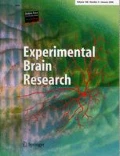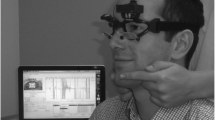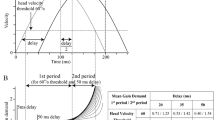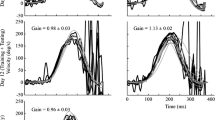Abstract.
To determine age-related changes, the initial horizontal vestibulo-ocular reflex (VOR) of 11 younger normal subjects (aged 20–32 years) was compared with that of 12 older subjects (aged 58–69 years) in response to random transients of whole-body acceleration of 1,000 and 2,800°/s2 delivered around eccentric vertical axes ranging from 10 cm anterior to 20 cm posterior to the eyes. Eye and head positions were sampled at 1,200 Hz using magnetic search coils. Subjects fixed targets 500 cm or 15 cm distant immediately before the unpredictable onset of rotation in darkness. For all testing conditions, younger subjects exhibited compensatory VOR slow phases with early gain (eye velocity/head velocity, interval 35–45 ms from onset of rotation) of 0.90±0.02 (mean ± SEM) for the higher head acceleration, and 0.79±0.02 for the lower acceleration. Older subjects had significantly (P<0.0001) lower early gain of 0.77±0.04 for the higher head acceleration and 0.70±0.02 for the lower acceleration. Late gain (125–135 ms from onset of rotation) was similar for the higher and lower head accelerations in younger subjects. Older subjects had significantly lower late gain at the higher head acceleration, but gain similar to the younger subjects at the lower acceleration. All younger subjects maintained slow-phase VOR eye velocity to values ≥200°/s throughout the 250-ms rotation, but, after an average of 120 ms rotation (mean eccentricity 13°), 8 older subjects consistently had abrupt declines (ADs) in slow-phase VOR velocity to 0°/s or even the anticompensatory direction. These ADs were failures of the VOR slow phase rather than saccades and were more frequent with the near target at the higher acceleration. Slow-phase latencies were 14.4±0.4 ms and 16.8±0.4 ms for older subjects at the higher and lower accelerations, significantly longer than comparable latencies of 10.0±0.5 ms and 12.0±0.6 ms for younger subjects. Late VOR gain modulation with target distance was significantly attenuated in older subjects only for the higher head acceleration.
Similar content being viewed by others
Author information
Authors and Affiliations
Additional information
Electronic Publication
Rights and permissions
About this article
Cite this article
Tian, JR., Shubayev, I., Baloh, R. et al. Impairments in the initial horizontal vestibulo-ocular reflex of older humans. Exp Brain Res 137, 309–322 (2001). https://doi.org/10.1007/s002210000671
Received:
Accepted:
Issue Date:
DOI: https://doi.org/10.1007/s002210000671




